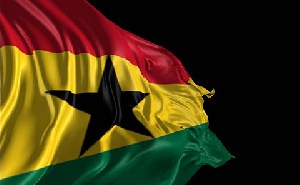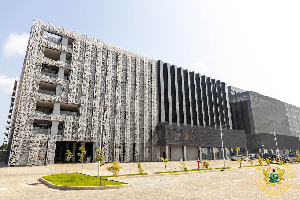The story of the peregrination of Ghana from the period of independence till now is full of inspiration depicting a glorious struggle. The astronomical successes chocked over the years is borne out of a continuous strive to make Ghana, a better place to live.
Undoubtedly, Ghana has progressed significantly economically, culturally, and democratically. In Agriculture, Commerce and Trade, Foreign Affairs, International relations, Youth Empowerment, Human Rights, Politics, Rule of Law, among other sectors of development have witnessed significant strides made so far.
Going forward, and with this posture in perspective, the future becomes more hopeful for country Ghana as a signatory to Africa's Agenda 2063. This long term development plan, if not wasted will harness Ghana on its road to becoming a successful state.
The Agenda 2063 dubbed, "The Africa We Want" is a shared vision for a prosperous Africa. Agenda 2063 has seven (7) key indicators serving as the promise land all countries on the African continent wants to reach for the total liberations of their indigenes. Several indications clearly points out that Ghana is really making headways in terms of achieving the Agenda 2063 goals or visions.
Based on her achievement in governance since democracy, the perspective of Ghana regarding the Agenda 2063 is chronicled as follows:
First and foremost, while The Agenda 2063 aims for democratic governance, Ghana is already in headways. With over two decades of practised democracy, the country can now boast of systems for Multi-Party Politics, Decentralized Local Governance, regulated independent Public Institutions and Civil Society Organizations (CSO), Rule of Law, Freedom of Speech, Freedom of Media backed by Acts, or Laws, Statutes and Decrees to foster development.
Ghana's democracy climbed to the peak after the Supreme Court decided on Election 2012 case filed by the opposition New Patriotic Party (NPP). It was contesting election victory for incumbent party, National Democratic Congress (NDC) and its flagbearer, Former President John Dramani Mahama but petition was dismissed. This really projected Ghana as a matured democratic state to the international world for maintaining political stability and tolerance by all political stakeholders and emerging peaceful afterwards in such landmark case. Ghana has progressed steadily in democracy in her quest for Good Governance, Democracy, Respect for Human Rights, Justice and the Rule of Law.
Furthermore, Section 28 of Aspiration 3 of the Agenda 2063 clearly expects the continent's population to enjoy affordable and timely access to independent courts and judiciary that deliver justice without fear or favour. Corruption and impunity will be a thing of the past.
In Ghana, there is the independence of the Judiciary to operate freely without fear or favour and it functions on accountability. The menace is been tackled in Ghana from all angles not sparing any. In 2015, twenty-one Lower Court Judges were Judges sacked, seven High Court Judges were suspended in the Judicial corruption scandal following an expose by Anas Aremyaw Anas' on the judiciary.
The agenda to say goodbye to corruption in Ghana did not end with Dr. Kwame Nkrumah but has been handed-down subsequent administrations to the current government. The current President, Nana Addo Dankwa Akuffo Addo is also poised to eradicate corruption and save the state coffers with a Special Prosecutor, Mr. Martin A.B.K Amidu at post to investigate and prosecute cases of corruption in the country without bias. In place are independent institutions helping fight the menace such as Economic and Organized Crime Office (EOCO), Beareu of National Investigations (BNI), CHRAJ and others.
We can therefore attest to the fact that Ghana is on course with regards to this goal.
In addition, Africa must be a continent where democratic values, culture practices, universal principles of human rights, gender equality, justice and the rule of law are entrenched; and Have capable institutions and transformative leadership in place at all. Ghana stands out on the Africa continent for its democratic values, cultural practices, human rights, gender equality among others.
There is an independent and decentralized Judiciary, other public institutions and CSO projecting and safeguarding human rights. Also, Ghanaians are people that behold their culture in high esteem, from festivals, marriage and naming ceremonies to funeral, burial rites and other traditional cultural practices.
This country have a history of some barbaric and uncivilized cultural practices like the Female Genital Mutilation, the Trokosi system, Witch camps among others. Today, some of these practices have been curtailed and others reduced to the barest minimum. This is due to several calls from human right activists, non-governmental organizations and civil society. Gradually, Ghana is getting there in these areas.
Finally, Africa will be a continent where the institutions are at the service of its people. Citizens will actively participate in social, economic and political development and management. Competent, professional, rules and merit-based public Institutions will serve the continent and deliver effective and efficient services.
Our institutions must work knowing they are at the behest because of the ordinary citizen. Ghana has an enviable record of successful elections devoid of civil war, coup d'etat, or any political unrest. In the context of Ghana, citizens have used their power to franchise to demand change from power holders. Over the years, political parties and politicians have accepted various defeats amicably and moved on.
If Ghana and other countries will continue to seek the best from their leaders and hold them accountable, by peaceful means, there will be light at the end of the tunnel.
Another area where Ghana has really distinguished itself is International relations. Indeed, the areas where Ghana has distinguished itself includes international diplomacy, conflicts resolution, and economic relations, trade, health and education exchange programs, among others. One example that recently transpired in Africa was the Ghana/Cote d'Ivoire maritime dispute. Infact, the two countries exhibited outstanding democratic maturity and respected the relations that exist between both countries during and after trials at the International Tribunal on the Law of the Sea (ITOLS).
Finally the Media. Ghana has really progressed in this dimension as history has it. After the introduction of Radio broadcasting in the 1930s by the colonial masters, efforts by Dr. Kwame Nkrumah led to the birth of Ghana Broadcasting Corporation (GBC). There was serious monopoly of the airwaves and so the likes of P.A.V Ansah continued advocating for the allowance of private radio and television stations to operate.
In 1994, Dr. Charles Wereko Brobbey took a bold step by establishing the first ever private radio station called Radio Eye. He was however arrested and the station closed down 24hrs into operations. But later in July 1995, Joy FM was lincesed as the first private station in Ghana. This opened the floodgate that led to proliferation of the media houses in Ghana. Today, journalists in Ghana enjoy good freedom to operate as the fourth estate of the realm. The 1992 Constitution of Ghana supports both Freedom of Speech (Article 61)and Mass Media (Article 162(3)). There has been a repeal of the Criminal Libel and Seditious Laws in 2001.
More media outlets in Ghana now. There is currently moves underway to pass the Right to information bill.
Moving forward, the Sixty-one year (61) old journey has been fruitful and Ghana has delivered so well with respect to The Agenda 2063 achievements. The current state of the country and measures and policies put in place clearly shows how penchant we are as people to achieving the goals stipulated in The Agenda. But can do more. To fully get closer and achieve the objectives in the agenda, the following policies must be worked towards.
These are my recommendations;
Our authorities must endeavour to finance their own development. Ghana and Africa must search inwardly to mobilize funds for resources to finance and accelerate its transformation, integration, peace, security, infrastructure, industrialization, democratic governance and strengthen individual state and regional institutions. President Nana Addo Dankwah recently called for a “Ghana Beyond Aid" which is in the right direction towards Agenda 2063.
According to President Akuffo Addo, he wants to build a Ghana which looks to the use of its own resources thereby, building an economy that will not be dependent on charity or donations but one that will look to the proper management and usage of its resources. This he believe will engineer social and economic growth in our country. Similarly, the current government is set to embark its "one district one factory project.
The policy is really in line with the above objectives and visions under the Agenda 2063 and must be executed. This will go a long way in the industrialization of the country. Governments should not relent on their efforts.
Furthermore, accountable leadership and responsive institutions: build visionary and accountable leadership, democratic and developmental governance and institutions, through robust and transparent planning, implementation, Monitoring and evaluation mechanisms at all levels. Building accountable leadership souls be the primary objectives of Ghanaian leadership.
This they must exercise their responsibilities as leaders devoid of corrupt minds. Civil societies and other non-governmental organizations can help in this regard. They must put their lens on our leadership by monitoring and putting them in check by holding them to their task.
Also, there is the need to ensure that we rebuild professional and public sector services. Indeed, our public institutions must be made to work again. If all the public sector institutions can work effectively without any corrupt mind-set and free from politicization then there will be great output for every well-meaning Ghanaian and Africans. This objective can be achieved fully when it is imitated in other African countries. The various institutions must also be tooled properly by respective governments to work properly.
To continue with, changed attitudes and mind-sets, self-reliance, solidarity, hard work and collective prosperity are needed to strenghten Pan Africanism and build on African successes, experiences and best practices to forge the African model of development and transformation. Truth be told! It is time we change our minds and attitudes about Ghana and the continent as a whole. Ghanaians or Africans must work hard in their respective spheres for a collective prosperity.
In conclusion, we call upon the international community to respect Africa's vision and aspirations for herself and align their partnerships appropriately. All countries on the African continent must sell their individual countries to the international community.
We can earn this respect by upholding good democratic values, respect for human rights, gender equality, and excellent democracy.
Opinions of Sunday, 27 May 2018
Columnist: Felix Kwaku-Dua















